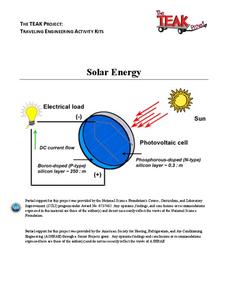Space Awareness
Oceans as a Heat Reservoir
Oceans absorb half of the carbon dioxide and 80 percent of the greenhouse gases released into the atmosphere. Scholars learn how and why the oceans store heat more effectively than land and how they help mitigate global warming. Pupils...
Bonneville
Bioreactor Water Circulation System
Make those microbes warm up water. Pupils first investigate water pumps, then design a water circulation system that uses solar energy. A bioreactor in the system takes energy from compost and helps heat water.
Curated OER
Gallery Walk Questions on Earth's Radiation Balance
Questions that can be used in a lesson on Earth's radiation balance are suggested in this resource. It is not a lesson plan, per se, but it is a list of questions for stations within a "Gallery Walk" lesson. The link to how Gallery Walks...
Texas State Energy Conservation Office
Investigation: Conservation of Energy
By rolling marbles down a six-foot length of track, physical scientists determine how much energy is lost to heat. It is recommended that you opt for the foam pipe insulation track because more friction slows the marble, allowing...
Science Matters
Energy and Winds
In the study of wind energy, scholars build a small windmill and observe how it transfers wind into mechanical energy. Learners will make connections to the previous lesson with concepts such as the creation of wind through convection.
Rochester Institute of Technology
Solar Energy
Warm up to the idea of solar energy. A lesson includes three activities that challenge scholars to apply knowledge in new ways. First, they learn to run an alarm clock without a battery by using solar energy. Next, they complete an...
Science Matters
Peanut Energy
How do humans get energy since they aren't mechanical and can't photosynthesize? Learners explore this question by relating potential energy in food to human energy levels. Scholars measure the change in mass and a change in temperature...








